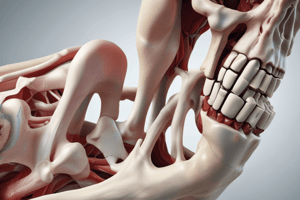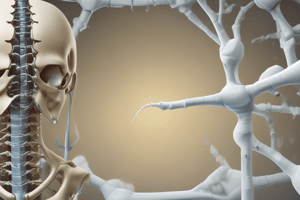Podcast
Questions and Answers
What is the total number of bones in the adult vertebral column?
What is the total number of bones in the adult vertebral column?
Which bone articulates with the fifth lumbar vertebra?
Which bone articulates with the fifth lumbar vertebra?
Which of the following functions is NOT supported by the vertebral column?
Which of the following functions is NOT supported by the vertebral column?
How many cervical vertebrae are present in the neck region?
How many cervical vertebrae are present in the neck region?
Signup and view all the answers
What type of curvature does the lumbar region of the spine exhibit?
What type of curvature does the lumbar region of the spine exhibit?
Signup and view all the answers
Which part of the vertebra articulates with the articular facet of the superior vertebra?
Which part of the vertebra articulates with the articular facet of the superior vertebra?
Signup and view all the answers
What do the intervertebral discs primarily function as?
What do the intervertebral discs primarily function as?
Signup and view all the answers
In children, how many bones comprise the vertebral column before fusion?
In children, how many bones comprise the vertebral column before fusion?
Signup and view all the answers
What is the total number of bones in the axial skeleton?
What is the total number of bones in the axial skeleton?
Signup and view all the answers
Which of the following is NOT part of the appendicular skeleton?
Which of the following is NOT part of the appendicular skeleton?
Signup and view all the answers
Which of the following lists only components of the axial skeleton?
Which of the following lists only components of the axial skeleton?
Signup and view all the answers
What is defined as a small rounded process or projection on a bone?
What is defined as a small rounded process or projection on a bone?
Signup and view all the answers
How many bones are there in the human skull?
How many bones are there in the human skull?
Signup and view all the answers
The bones that form the structure of the vertebral column belong to which skeletal division?
The bones that form the structure of the vertebral column belong to which skeletal division?
Signup and view all the answers
Which term refers to a large, round, and usually roughened projection on bones?
Which term refers to a large, round, and usually roughened projection on bones?
Signup and view all the answers
The term 'trochanter' is used specifically for large projections found on which bone?
The term 'trochanter' is used specifically for large projections found on which bone?
Signup and view all the answers
Which division of the skeletal system includes the bones of the upper and lower limbs?
Which division of the skeletal system includes the bones of the upper and lower limbs?
Signup and view all the answers
Which group of bones contributes to the central part of the human skeleton?
Which group of bones contributes to the central part of the human skeleton?
Signup and view all the answers
What is the defining characteristic of a crest on a bone?
What is the defining characteristic of a crest on a bone?
Signup and view all the answers
Which of the following is a less prominent ridge than a crest?
Which of the following is a less prominent ridge than a crest?
Signup and view all the answers
How many auditory ossicles are present in the human skeleton?
How many auditory ossicles are present in the human skeleton?
Signup and view all the answers
What is the structure called that serves as a prominent projection above a condyle?
What is the structure called that serves as a prominent projection above a condyle?
Signup and view all the answers
Identify the sharp, slender projection typically found on vertebrae.
Identify the sharp, slender projection typically found on vertebrae.
Signup and view all the answers
Which description best fits a tubercle?
Which description best fits a tubercle?
Signup and view all the answers
What is the shape of the manubrium in the sternum?
What is the shape of the manubrium in the sternum?
Signup and view all the answers
Which joints does the manubrium articulate with?
Which joints does the manubrium articulate with?
Signup and view all the answers
What is the smallest part of the sternum?
What is the smallest part of the sternum?
Signup and view all the answers
Which ribs attach to the sternal body?
Which ribs attach to the sternal body?
Signup and view all the answers
How many bones are there in the rib cage?
How many bones are there in the rib cage?
Signup and view all the answers
What anatomical feature is located on the manubrium?
What anatomical feature is located on the manubrium?
Signup and view all the answers
Which part of the sternum gives attachment to the diaphragm and rectus abdominis muscles?
Which part of the sternum gives attachment to the diaphragm and rectus abdominis muscles?
Signup and view all the answers
How many true ribs are present in the rib cage?
How many true ribs are present in the rib cage?
Signup and view all the answers
What is the renewal rate of spongy bone tissue per year?
What is the renewal rate of spongy bone tissue per year?
Signup and view all the answers
Which vitamin is essential for the synthesis of collagen in bone?
Which vitamin is essential for the synthesis of collagen in bone?
Signup and view all the answers
What hormone stimulates osteoblast activity during childhood?
What hormone stimulates osteoblast activity during childhood?
Signup and view all the answers
What is NOT a mineral necessary for bone growth and remodeling?
What is NOT a mineral necessary for bone growth and remodeling?
Signup and view all the answers
Which phase is characterized as the early inflammatory phase in bone fracture repair?
Which phase is characterized as the early inflammatory phase in bone fracture repair?
Signup and view all the answers
What condition is described as a series of microscopic fissures in bone without other tissue injury?
What condition is described as a series of microscopic fissures in bone without other tissue injury?
Signup and view all the answers
Which hormone enhances the synthesis of proteins necessary for new bone formation?
Which hormone enhances the synthesis of proteins necessary for new bone formation?
Signup and view all the answers
Which mineral is needed in smaller amounts during bone growth?
Which mineral is needed in smaller amounts during bone growth?
Signup and view all the answers
Study Notes
Bone Surface Markings
- Tubercle: A small rounded process or projection.
- Tuberosity: A large, round, and usually roughened projection.
- Trochanter: A large, usually rounded projection found only on the femur.
- Crest: A prominent border or ridge.
- Line: A less prominent ridge than a crest.
- Spinous process: A sharp, slender process.
- Epicondyle: A prominence above a condyle.
Divisions of the Skeletal System
- The human skeleton consists of 206 bones grouped into two divisions: axial skeleton (80 bones) and appendicular skeleton (126 bones).
- The axial skeleton is the core of the skeleton and includes the skull bones, hyoid bone, vertebrae, ribs, and sternum.
- The appendicular skeleton is attached to the axial skeleton and includes the pectoral girdle, bony pelvis, upper limbs, and lower limbs.
Skull
- The skull is made up of 28 bones, including 8 cranial bones, 14 facial bones, and 6 auditory ossicles.
- Cranial bones: Frontal (1), Parietal (2), Temporal (2),
- Facial bones:
- Auditory ossicles:
Vertebral Column
- The vertebral column consists of 26 bones (33 in children), grouped into 5 regions: cervical (7), thoracic (12), lumbar (5), sacrum (1), and coccyx (1).
- Cervical vertebrae: Located in the neck.
- Thoracic vertebrae: Located in the upper back, each articulating with one or more ribs.
- Lumbar vertebrae: Located in the lower back.
- Sacrum: Articulates with the fifth lumbar vertebra and the coccyx, formed by the fusion of 5 bones.
- Coccyx: Articulates with the sacrum, formed by the fusion of 4 bones.
Functions of the Vertebral Column
- Protects the spinal cord: Vertebral foramina form the vertebral canal, which protects the delicate spinal cord.
- Allows movement: Numerous individual bones allow for movement.
- Supports the skull:
- Shock absorber: Intervertebral discs function as shock absorbers, protecting the brain.
- Trunk axis: Forms the axis of the trunk, providing attachments for ribs, shoulder/pelvic girdles, and upper/lower limbs.
Vertebral Anatomy
- Body: Main, weight-bearing part of the vertebra.
- Vertebral foramen: Opening in the vertebra, forming the vertebral canal.
- Pedicles: Short, thick projections that connect the body to the lamina.
- Lamina: Flat, bony plate that forms the posterior part of the vertebral arch.
- Spinous process: Projection that extends posteriorly from the lamina.
- Transverse process: Projection that extends laterally from the lamina.
- Articular processes: Projections with smooth articular facets on their surfaces.
- Superior articular process: Articulates with the inferior articular process of the superior vertebra.
- Inferior articular process: Articulates with the superior articular process of the inferior vertebra.
Sternum
- The sternum is a flat bone located in the middle of the front of the chest.
- Manubrium: Superior portion, broad and triangular, articulates with the clavicles and first rib pair.
- Sternal body: Middle part, tongue-shaped, attaches to the manubrium and costal cartilages of ribs 2-7.
- Xiphoid process: Smallest part, attaches to the sternal body, and provides attachment points for the diaphragm and rectus abdominis muscles.
Rib Cage
- The rib cage consists of 25 bones: 24 ribs and the sternum.
- Ribs: 7 pairs of true ribs, 3 pairs of false ribs, and 2 pairs of floating ribs.
- Sternum: The single bone that forms the front of the rib cage.
Factors Affecting Bone Growth and Remodeling
- Adequate dietary intake of minerals and vitamins is crucial for bone growth and remodeling.
- Minerals: Calcium and phosphorus are essential, while magnesium, fluoride, and manganese are required in smaller amounts.
- Vitamins: Vitamin A stimulates osteoblasts, Vitamin C is required for collagen synthesis, Vitamin D increases calcium absorption, and Vitamins K and B12 are needed for bone protein synthesis.
- Hormones: Insulin-like growth factors (IGFs), human growth hormone (hGH), thyroid hormones (T3 and T4), and insulin promote bone growth.
Fracture and Repair of Bone
- A fracture is any break in a bone.
- Stress fracture: Microscopic fissures in bone without injury to other tissues, caused by repeated strenuous activities.
- Reactive phase: Early inflammatory phase following a fracture, where blood vessels across the fracture line are broken.
Studying That Suits You
Use AI to generate personalized quizzes and flashcards to suit your learning preferences.
Related Documents
Description
Test your knowledge on bone surface markings and the divisions of the human skeletal system. This quiz covers key terms like tubercle, tuberosity, and the components of the axial and appendicular skeletons, including the skull. Challenge yourself and enhance your understanding of human anatomy!




